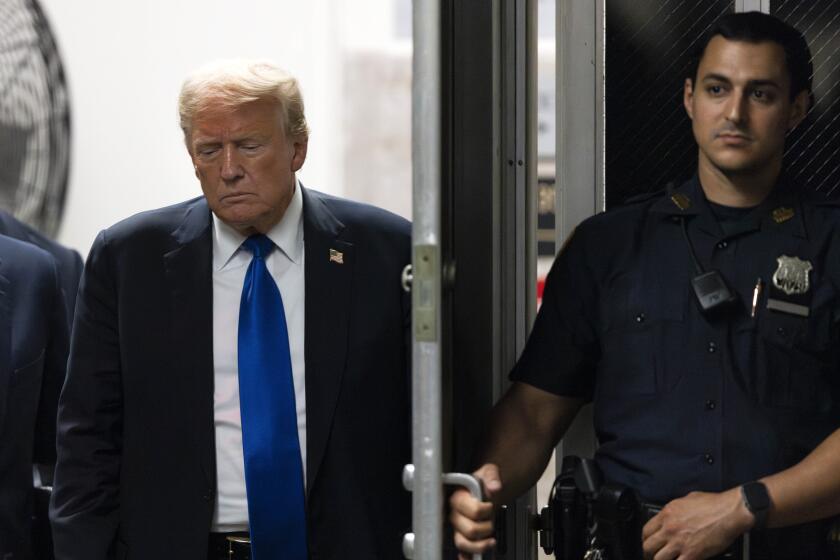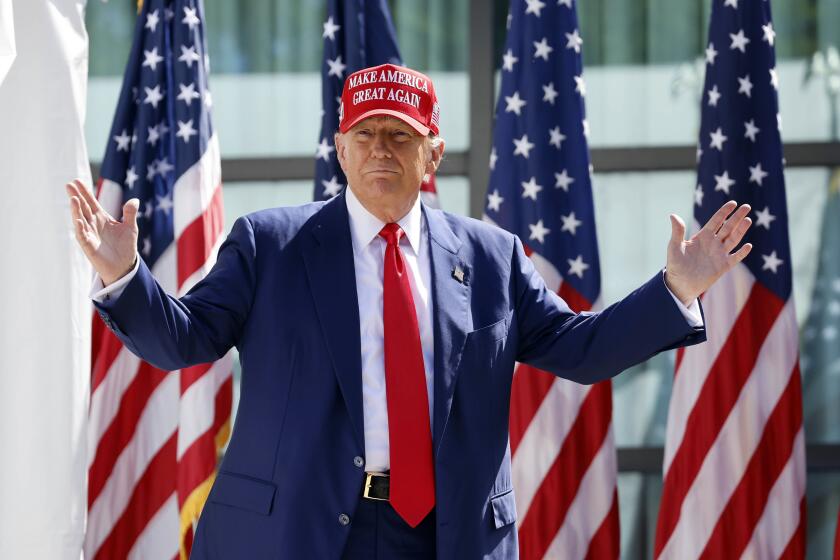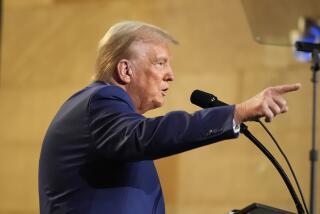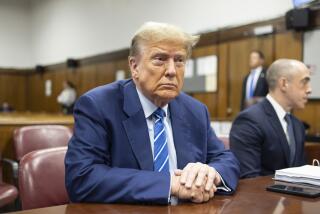Judge alters Trump’s gag order, lets him talk about jurors and witnesses after hush money conviction
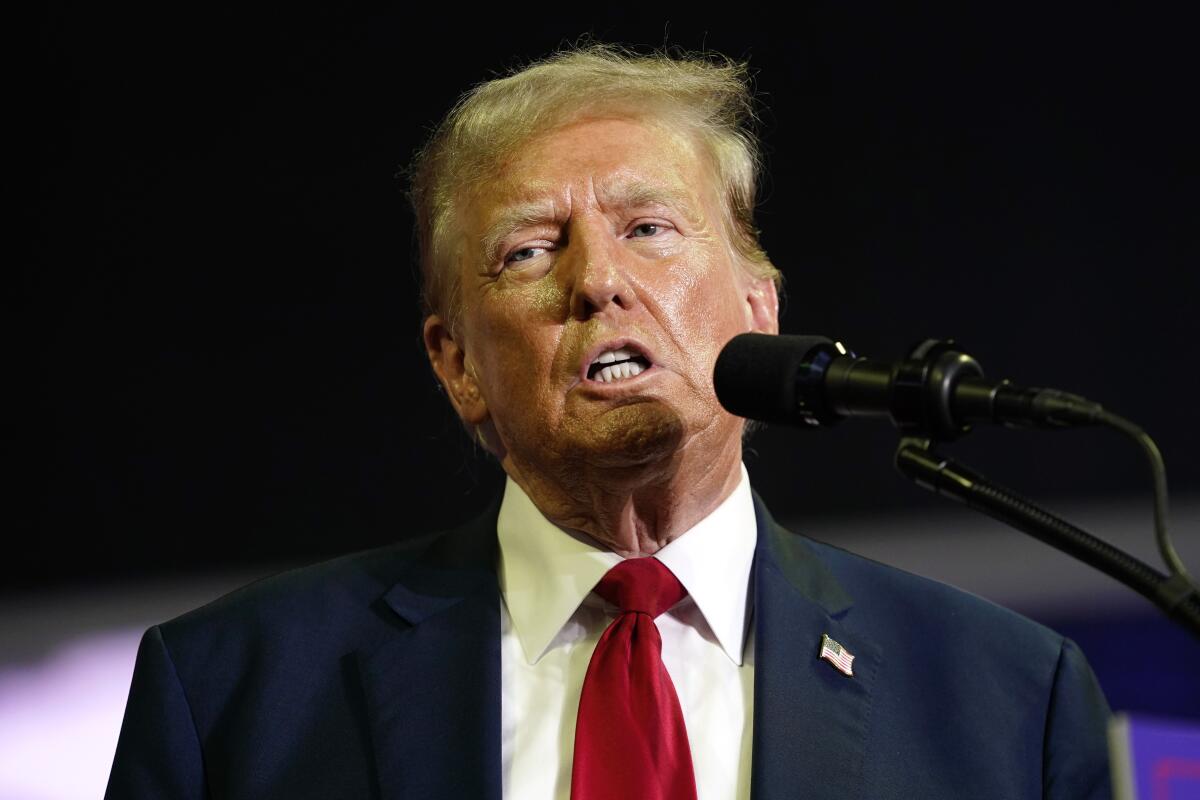
NEW YORK — A Manhattan judge on Tuesday modified Donald Trump’s gag order, freeing the former president to comment publicly about witnesses and jurors in the hush money criminal trial that led to his felony conviction but keeping others connected to the case off limits at least until he’s sentenced July 11.
Judge Juan M. Merchan’s ruling — just days before Trump’s debate Thursday with President Biden — clears the presumptive Republican nominee to again go on the attack against his former lawyer Michael Cohen, porn actor Stormy Daniels and other trial witnesses. Trump was convicted in New York on May 30 of falsifying records to cover up a potential sex scandal, making him the first ex-president convicted of a crime.
In a five-page ruling, Merchan wrote that the gag order was meant to “protect the integrity of the judicial proceedings” and that protections for witnesses and jurors no longer applied now that the trial has ended and the jury has been discharged.
Merchan said it had been his “strong preference” to continue barring Trump from commenting about jurors, whose names have not been made public, but that he couldn’t justify doing so. The judge did leave in place a separate order prohibiting Trump and his lawyers from disclosing the identities of individual jurors or their addresses. Trump lawyer Todd Blanche said after the verdict the defense team had destroyed that information.
“There is ample evidence to justify continued concern for the jurors,” Merchan wrote.
Merchan also left in place a ban on Trump commenting about court staffers, the prosecution team and their families until he is sentenced, writing that they must “continue to perform their lawful duties free from threats, intimidation, harassment, and harm.” Those restrictions do not prohibit Trump from commenting about the judge himself or Dist. Atty. Alvin Bragg, whose office prosecuted the case.
Trump’s lawyers had urged Merchan to lift the gag order completely, arguing there was nothing to justify continued restrictions on Trump’s 1st Amendment rights after the trial’s conclusion. Trump has said that the gag order prevented him from defending himself while Cohen and Daniels continue to criticize him.
Trump’s campaign spokesperson Steven Cheung said Trump and his lawyers would challenge the order over the portions of the gag order still in effect.
The Manhattan district attorney’s office asked Merchan to keep the gag order’s ban on comments about jurors, court staffers and the prosecution team in place at least until Trump is sentenced but said last week they would be OK with allowing Trump to comment about witnesses now that the trial is over. A message seeking comment was left with the Manhattan D.A.’s office.
Cohen, who testified for four days against his ex-boss, reacted to the ruling via text message. He wrote: “For the past 6 years, Donald and acolytes have been making constant negative statements about me. Donald’s failed strategy of discrediting me so that he can avoid accountability didn’t work then and won’t work now.”
Daniels’ lawyer Clark Brewster said they “have nothing but respect” for Merchan and defer to his post-verdict review of the gag order “in the context of free speech and any continuing danger to the judicial process.”
Trump was convicted on 34 counts of falsifying business records arising from what prosecutors said was an attempt to cover up a hush money payment to Daniels just before the 2016 presidential election. She says she had a sexual encounter with Trump a decade earlier, which he denies.
Jurors deliberated for 9½ hours over two days before convicting former President Trump of all 34 counts he faced in a hush-money scheme surrounding the 2016 election.
The crime is punishable by up to four years behind bars, but prosecutors have not said if they would seek incarceration, and it’s unclear whether Merchan would impose such a sentence. Other options include a fine or probation.
Following his conviction, Trump complained that he was under a “nasty gag order” while also testing its limits. In remarks a day after his conviction, Trump referred to Cohen, though not by name, as “a sleazebag.”
In a subsequent Newsmax interview, Trump took issue with jury and its makeup, complaining about Manhattan, “It’s a very, very liberal Democrat area so I knew we were in deep trouble,” and claiming: “I never saw a glimmer of a smile from the jury. No, this was a venue that was very unfair. A tiny fraction of the people are Republicans.”
Prosecutors urge a New York judge to uphold the gag order barring Donald Trump from criticizing jurors who convicted him of felonies in his hush money case.
Trump’s lawyers, who said they were under the impression the gag order would end with a verdict, wrote a letter to Merchan on June 4 asking him to lift the order.
Prosecutors urged Merchan to keep the gag order’s ban on comments about jurors and trial staff in place “at least through the sentencing hearing and the resolution of any post-trial motions.” They argued that the judge had “an obligation to protect the integrity of these proceedings and the fair administration of justice.”
Merchan issued Trump’s gag order on March 26, a few weeks before the start of the trial, after prosecutors raised concerns about the presumptive Republican presidential nominee’s propensity to assail people involved in his cases.
During the trial, Merchan held Trump in contempt of court, fined him $10,000 for violating the gag order and threatened to put him in jail if he did it again.
In seeking to lift the gag order, Trump lawyers Todd Blanche and Emil Bove argued that Trump was entitled to “unrestrained campaign advocacy” in light of Biden’s public comments about the verdict, and Cohen and Daniels’ continued public criticism.
Sisak writes for the Associated Press.
More to Read
Sign up for Essential California
The most important California stories and recommendations in your inbox every morning.
You may occasionally receive promotional content from the Los Angeles Times.
